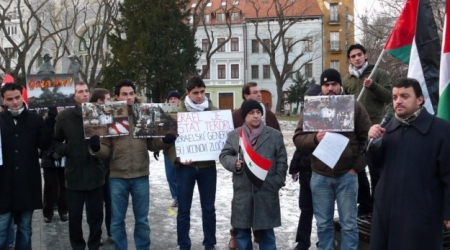A student-led movement taking shape on U.S. college campuses have seen a growing number of young activists organizing around solidarity with Palestine.Al Ray correspondence reports that Students for Justice in Palestine, one of the major solidarity coalitions, now has more than 110 active chapters in the U.S. and the number is growing.
The movement enjoys the backing from those with a wide array of political thought and a support base that significantly grew after Israel’s ‘Operation Cast Lead’ and ‘Operation Protective Edge’ assaults on Gaza in 2008-09 and this summer respectively.
According to Aman Muqeet of the organization’s National Steering Committee, Israel’s summer offensive affected all of those who are in solidarity with the Palestinian people. ‘It has strengthened our resolve and commitment to the work we do.’
Operation Protective Edge began July 7 and lasted for 51 days; it killed more than 2,000 Palestinians, mostly civilians, according to Palestinian health officials. More than 10,000 others were reported injured.
‘Also, it has empowered us because we have seen an unprecedented amount of support from the international community,’ Muqeet said. ‘Musicians, actors, and public figures voicing support for Gaza, corporations distancing themselves from Israeli crimes; consumers joining the Palestinian-led call for a boycott of Israeli goods and corporations that support Israel; millions of people around the world taking to the streets to demand justice.’
He says public opinion in the U.S. and the West shifted significantly after Israel’s summer assault.
‘The Protective Edge massacre has brought the realities of a brutal colonial empire to the fore … On campuses, students are more informed than they were in the past and are keeping up with the developments.’
An Oct. 24 report by the New York-based Jewish organization Anti-Defamation League reported a dramatic increase in the number of pro-Palestine events scheduled on U.S. campuses since the massacre.
There were 75 events scheduled since the beginning of the 2014-2015 academic year, which started in late August or early September at most American universities, the report said. That number marks a 114 percent increase compared with the same period last year.
Continue reading at Al Ray Palestinian Media Agency.

